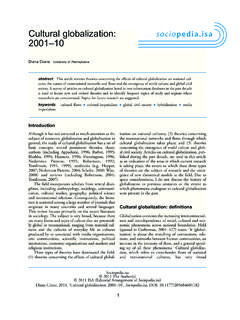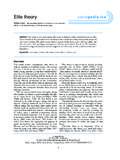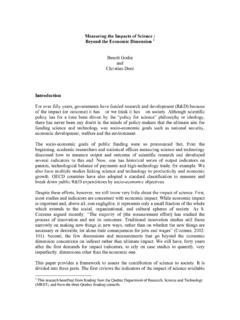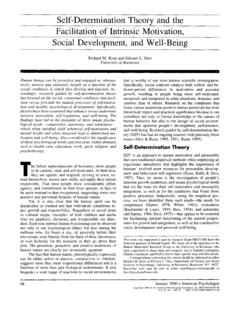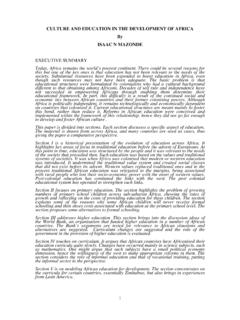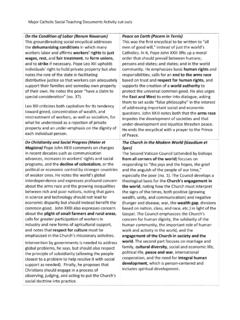Transcription of Social transformation, development and globalization
1 2014 The Author(s) 2014 ISA (Editorial Arrangement of )Habibul H Khondker and Ulrike Schuerkens, 2014, Social transformation , development and globalization , , DOI: transformation implies a fundamental changein society, which can be contrasted with Social changeviewed as gradual or incremental changes over a peri-od of time. Social change has been the subject of agood part of sociology from Ibn Khaldun of the four-teenth century to Immanuel Wallerstein in the twen-ty-first century. Sociology of development is a field ofstudy in sociology that primarily deals with issues ofdevelopment and change in what is euphemisticallycalled the global South, or in the past as developingcountries. Studies of Social transformation encompassa wide range of institutional and cultural changes insociety throughout history. The modalities, causes andconsequences of Social change have been contemplat-ed by philosophers and sages from time observation of Heraclitus ( BC 475 BC)that you cannot step twice into the same river cap-tures the essence of the constancy of change.
2 Changeis eternal. Although the idea of Social change is moreor less universal, sometimes there are disagreementson the directionality of change as with the mecha-nisms of change. In the Judeo-Christian-Islamic (sometimes,referred to as the western ) discourse emanating fromthe ancient Egyptian and Greek civilizations, time wasperceived as an arrow, moving forward in a linear tra-jectory. In the Hindu (Indian) concept, time wascyclical. The epochs, in the Hindu tradition, regressfrom the age of truth (satya yuga) to one of material-ism, sin and corruption (kali yuga). The idea of mil-lenarianism an epochal change for the good afterimmersing in sin is shared in a variety of cosmological differences account for the cultur-al variations in the perceptions of Social transforma-tion. In both Confucian and Hindu traditions,change was viewed with trepidation. Vestiges of suchlong-standing traditions are gradually giving way tothe forces of modernization and global transforma-tion.
3 Karl Marx in the nineteenth century was pre-scient in predicting that the forces of moderncapitalism would demolish the Chinese walls. Marxwas heir to the western Enlightenment thought thatmade progress a article presents the various theoretical approaches to the study of Social transformationand sociology of development since the emergence of this sub-field in sociology. In discussing various par-adigms of Social change and Social transformation , the article questions the Eurocentric assumptions of aseemingly linear trajectory. In summarizing the developments in the field of sociology of development ,this article synthesizes various theoretical strands such as modernization theories, dependency and world-systems theories, and globalization and multiple modernity global South glocalization Social change sociology of development Social transformation , development and globalizationHabibul H Khondker Zayed University, UAEU lrike Schuerkens cole des Hautes tudes en Sciences Sociales, France2 Khondker and SchuerkensSocial transformationProgress and classical sociologyThe notion of progress the continuous unfoldingof improvement in society was embedded in Greekphilosophy, which influenced the Enlightenmentphilosophy.
4 An alternative enlightenment took placeearlier in the Islamic world between 800 and 1200(Starr, 2013) which did not endure. Sociology as adiscipline was born in the context of the discourseover Social progress when European society wasexposed to changes induced by industrialization ofthe nineteenth century. In the writings of Saint-Simon (1760 1825), August Comte (1798 1857),Herbert Spencer (1820 1903), Alexis de Tocqueville(1805 1859) and Karl Marx (1818 1883), thefounding figures of sociology, Social change or socialdynamics occupied a central place. Max Weber(1864 1920) and mile Durkheim (1858 1917)focused a great deal of attention on Social change andits consequences, albeit from different theoreticalemphases. The two dominant views on Social changeare rooted in the difference between Social evolutionand historical Social change. For Social evolutionists, Social change follows a predictable and irreversiblepattern.
5 Society evolves from a simple to a higher,complex stage. This simple-minded view of linearityhas now been replaced by non-linearity and contin-gency. Historians of Social transformation , thoughnot always free from the influence of evolutionism,examined Social change as a process fraught with ran-dom and unpredictable events. The urban revolutionof the Neolithic period ( years BC) and theindustrial revolution of the late eighteenth centurywere transformative (Goody, 1998). Social revolutions though with hind-sight lookplausible often come as surprises. The collapse ofthe really existing Soviet socialism was but a recentcase in the closing years of the twentieth end of the socialist system also damaged thecareer of the orthodox Marxist perspective of socialchange. Yet academic Marxist or politico-economicscholarship on macro-historical Social change con-tinued to play an important role in the studies ofsocial change (Hobsbawm, 1975; Moore, 1966;Skocpol, 1979; Tilly, 1990; Wallerstein, 1974).
6 Weber s hermeneutical and comparative historicalinterpretations also introduced a rigorous study ofsocial transformations which emphasized the role ofculture. The works of David Landes (1983, 1998)and anthropological and ethnological research haveprovided considerable evidence and arguments infavour of taking culture developing the theories of Social change andmodernization, sociologists (and Social scientists ingeneral) draw upon the contributions of classicalsociologists such as the works of those who weregrappling with the rise of the capitalist industrialsociety in the nineteenth century. Their focus was ondifferent aspects of this Social transformation . WhileMarx was preoccupied with the new Social relationsof exploitation, and predicting a path towards an endof exploitation, Weber was concerned with the para-doxical consequences of modernization and culturaltransformations, and de Tocqueville was examiningthe Social circumstances that gave rise to the demo-cratic Social order.
7 Durkheim, the first systematicsociologist, examined the Social and cultural conse-quences of the growing division of labour and spe-cialization in society brought in by major intellectual figures of the mid-nineteenthand early twentieth centuries were engaged with keyaspects of modernity and the understanding of mod-ern society which became a main concern of sociol-ogy. The master trends of modernization were: amove towards equality (equalization), administrativecentralization (the emergence of state or state-likeorganizations), industrialization, urbanization andthe rise of rationalized bureaucracy (Weber). Forthe purpose of contemporary discussions on devel-opment (and modernization), one can see in thisoutlines of notions such as democratization, genderempowerment and issues of governance that rely onstate capacity as well as rationalization and that haveboth a cultural dimension as well as an individualone.
8 Rise of modernization theoriesIn the post-Second World War period, sociologiststurned their focus away from the really existing Social transformations and indulged in abstract theo-ry building (Parsons, 1959). In the sociological for-mulations of Talcott Parsons who developed thetheory of structural-functionalism, modernizationwas viewed as adaptation of the Social system alongthe western model of Social institutions. As a num-ber of Social scientists examined the Social conse-quences of economic development (Moore, 1965;Smelser, 1959), others sought to explore the culturaland Social institutional forces that thwarted develop-ment (Hoselitz, 1952). By then sociology embracedempiricism as a dominant methodological approachbased on a positivistic epistemology. Since the 1960s, the phenomenon of socialchange in the countries of the South has been a par-ticular discussion topic of Social scientists.
9 A greatvariety of approaches can be found. These approach-es began in the 1960s with the theories of modern-ization of Anglo-Saxon origin. During the sameperiod, theories of structural change and a structur-al-functionalist approach were developed. 3 Khondker and SchuerkensSocial transformationStudies of Social change in the twentieth centuryaddressed such issues as Social revolutions, the twoWorld Wars, decline of imperialism, rise of the newnation-states, socialism, the Cold War and the col-lapse of the really existing socialism. The post-Second World War period has been particularlyfertile for the research and reflections on socialchange in the so-called Third World or what is nowknown as the global South. Modernization of the global SouthBoth the temporal and structural aspects of develop-ment in the Southern countries were studied bymodernization theorists. Colonization had animportant influence on the structural changes of thelocal Social systems, which had contacts with differ-ent colonial powers since the end of the nineteenthcentury in Asia and Africa and two centuries earlierin Latin America.
10 Change induced by various colo-nial politics consisted of introducing a formal educa-tional system, paid labour and a bureaucratic system(Schuerkens, 2001a). Despite great differencesbetween local autochthonous groups, we can todayfind elites who support a rather identical develop-ment in their respective countries. Although colonialinterventions came from outside the differentregions, changes of the local autochthonous societies that could have been separated by artificial colonialfrontiers that were maintained after independence had to be adapted to this model originating fromanother Social system that had had an increasinginfluence since the beginning of the twentieth centu-ry (regarding Africa south of the Sahara, seeSchuerkens, 2001b). The integration of different elements from thissystem with those of local societies happened slowlyand gradually. Today, no groups remain worldwidewhich are not influenced by structures of global, andoften western models thanks to internationalmigrants, the Internet and mass media.


